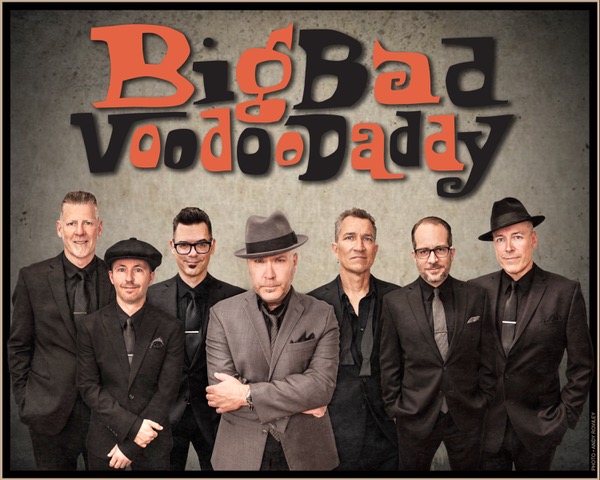If you were around in the 90’s, there was no escaping it… the swing and jazz movement was everywhere. It seems that anytime we turned on the TV, swing music was in every commercial. If we went to the movies, there’s a chance they made a cameo. But one band seemed to have an epic stronghold on the genre, appearing in more media spots than anyone else.
Big Bad Voodoo Daddy was just as big of a household name as Brian Setzer Orchestra or Cherry Poppin’ Daddies, but you likely saw them more. From appearing in “Swingers” to the Super Bowl (yes, they played the Super Bowl!), there’s a good chance you’ve seen them in some form— and if you head to their Liberty Hall Show on Friday, you’ll understand what’s given them so much lasting power decades on from the 90’s swing revival.
From Swamp to Swing
Drummer Kurt Sodergren is one of the original founding members of the band. He, along with vocalist Scotty Morris, founded the band in 1989 in Los Angeles, though they were close musical acquaintances prior to that. “I met Scott in about 1988 and we were both playing in bands. But we got together and played guitar and drums a few times where his band practiced, so I would sneak onto his band’s drum set. We really clicked, so we enjoyed playing together just the two of us,” he says of their “swampy, blues, Americana” band. But then, Morris surprised Sodergren by suggesting they play swing music. “We were playing American roots rockabilly. Scott said he wanted to do it [swing], but he didn’t want to switch his loud amp out. So it still had that loud energy while still playing our version of swing music. It wasn’t traditional, and it really struck a chord in people and we were able to play a lot of clubs and bars.”
The idea for adding an acoustic bass came up in a non-traditional way as well. They were searching for a bassist and called a potential player, when they noticed something unique upon dialing him up. “I had called his phone number, and he was playing it on his answering machine,” Sodergren says. “I called Scott and said ‘Listen to this!’ And that was his audition, just him on his answering machine.”
From there, the band took off. They were selling their CDs out of the back of their vehicle, and reaching out as far as Texas but never making it much further than that until they got a big break when they were cast in “Swingers.” “When that movie came out, we were able to play from here to New York and back,” Sodergren says. That, combined with the 90’s swing obsession, threw the band into a whirlwind for a few years.
“We had that first really big record in ’98, and we toured on that for about a year and a half, and I think we won best club tour in Pollster Magazine,” he says. “During that time we sold out everything. We got the cover of that magazine which was pretty prestigious for us. Then we did the Super Bowl, then we released our second record, then things started dying down.” The band knew they had to switch up their method, which is what Sodergren attributes to their lasting power.
Playing for the People
They started playing jazz clubs and festivals, and even played pop symphony shows. Their first symphony show was with the Air Force Band. Sodergren says they did it for free, but got to keep the charts, which helped them with future symphony shows. “That’s one of the things, the symphony shows, the music doesn’t go away. People love that kind of music,” he says. “We managed ourselves as much as we could and try to think one step ahead, and I think that’s just how we’ve been able to do it. Try to reach out and play for middle America and play for everybody. Rather than play for people who can dance or dress up and dance, we wanted to reach out and play for everybody.”
Though they’ve played prestigious venues like the Kennedy Center and Presidential Inaugural Balls, they’ve made a steady career out of hitting those overlooked spots in Middle America. At the time of this interview, Sodergren was still buzzed off a Colorado show that was all ages. “It was really nice because people were dancing and they really liked to party,” he says. “But really, it’s all ages. I think we’re one band, fortunately, that a whole family can enjoy. A parent won’t listen to what their kid’s listening to and say ‘We don’t understand this at all,’ they’re all on board.” The band’s fans also boast longevity and loyalty. Sodergren noticed one woman who came to see them when she was pregnant come back with her teen daughter years later.
Back On The Road
That’s the kind of magic you get to see in smaller communities. Sodergren says this is where the band can experiment with the setlist. “Right now, we’re working on some new songs, so we’re trying to play something that is retrospective, all our music,” he says. “We’re also working on some new songs, so we’re trying to play something from every single record for this tour.”
New music is an exciting aspect for the band with more than 30 years of recordings. If anything, it’s a sign that the band has no plans of slowing down, something that became abundantly clear during the shutdown. “I’m not gonna lie, having a sabbatical was nice, but when we started going back out and playing, everyone was so happy that we were back out,” Sodergren admits. “I never took it for granted, the audience and what they felt. But I was a little burnt from the grind. I appreciate how hard people are working right now and how great it is to get out and have a night out and seeing the smiles on the faces, how pleased everyone was to be back out seeing live music, it means a lot to me.”
Even with new music a ways out, the band doesn’t have plans of slowing down their touring schedule. “We don’t have a radio hit right now, it’s just a really fun night of great music. People like seeing real instruments and playing American music, people get off on that and we love seeing people smiling,” Sodergren says, recalling his most recent Colorado show. “Even the ushers were standing in the aisle dancing and clapping. It feels really great, and it’s what I like.”
Big Bad Voodoo Daddy play Liberty Hall this Friday, February 24, 2023, at 8:00 p.m.


